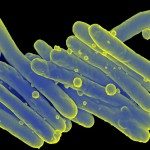Link to Pubmed [PMID] – 40269088
Link to DOI – 10.1038/s42003-025-07877-4
Commun Biol 2025 Apr; 8(1): 653
Cystic fibrosis (CF) is a genetic disease caused by dysfunction in the Cystic Fibrosis Transmembrane Conductance Regulator (CFTR) chloride channel. Patients with CF are hypersusceptible to Mycobacterium abscessus infection, a fast-growing mycobacterium and harmful opportunistic pathogen. Although CFTR dysfunction is known as a host susceptibility factor for M. abscessus infection, the functional impact of the trimeric Epithelial sodium Channel (ENaC), whose activity is negatively regulated by CFTR, towards M. abscessus infection has not been explored yet. To address this issue, we took advantage of miR-263a deficient Drosophila presenting a CF-like phenotype due to ENaC hyperactivity (ENaC+ ). We observed that the ENaC+ flies were as hypersusceptible to M. abscessus infection as the Cftr-deficient flies. The hypersensitivity of ENaC+ flies to M. abscessus infection was fully rescued by blocking ENaC hyperactivity, both chemically and genetically. Furthermore, we observed that ENaC hyperactivity per se was detrimental to ENaC+ Drosophila, as they were unable to mount an efficient humoral immune response. Upon infection, ENaC+ flies failed to upregulate 20-hydroxyecdysone production, which subsequently altered the production of protective antimicrobial peptides against M. abscessus. Overall, our results show that ENaC plays a key role in host susceptibility to M. abscessus infection and, correlatively to other CF pathogens.

